The lowest rung of the housing ladder?
- Published
Tim Coglan, from Blackpool Council, talks about the resort's houses in multiple occupation
A growing number of people on low incomes are now living in shared housing - known as "houses in multiple occupation" - where each room is rented separately. But there's concern that many tenants are living in poor conditions.
In a dirty entrance hall of a large run down seafront building, Alex Bracken vigorously shakes a can of flea spray. She sprays everyone's legs thoroughly.
"There are quite a lot of fleas in this property. We were badly bitten last week," she explains.
Bracken, Blackpool's Council's housing enforcement manager, leads the way up the badly carpeted stairs, followed by two colleagues and a police community support officer. They check a fire extinguisher in the landing. It is empty.
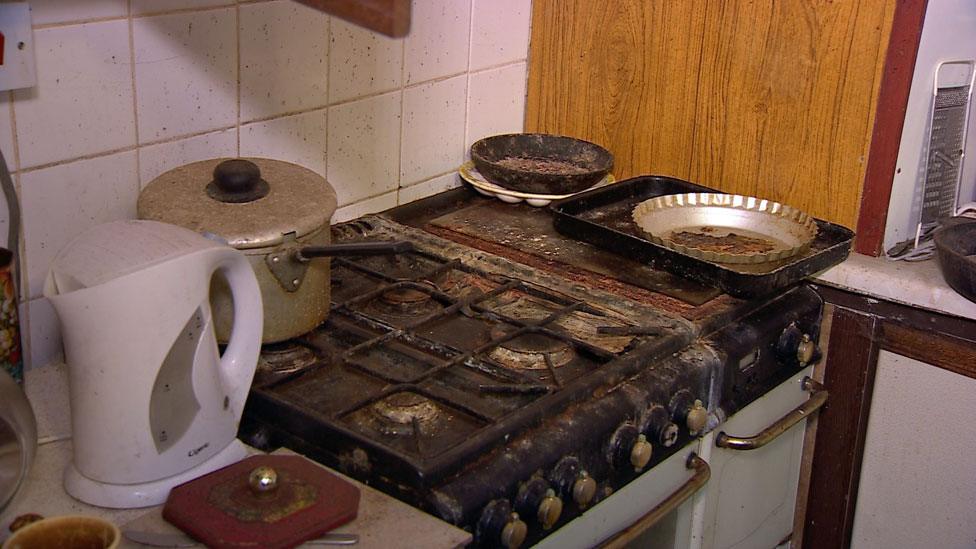
Dirty pots on the hob in another house
A dog barks inside one of the 24 flats. Bracken knocks loudly: "Blackpool Council. Open up please. We need to come in."
After some minutes the door opens and two pale women peer out. A strong, musty smell drifts outwards.
A roll of sticky paper hanging from the ceiling is covered in dead flies. An empty vodka bottle stands on a dusty table. The Staffordshire terrier barks and a scrawny cat paws the dirty furniture. The tenant is not there, his girlfriend says.
Bracken is here to deliver letters warning tenants about anti-social behaviour. Neighbours have been complaining about noise, drunkenness and threats of violence.
On the way back downstairs she meets the tenant, a young man in a hoodie whose teeth are stained yellow and brown. "This is serious," she tells him. "If you continue your anti-social behaviour we will take further enforcement action which could result in prosecution."
He nods and agrees to contact a local charity to rehouse the cat.
This property, right on the seafront and a short distance from the tower, is one of Blackpool's 4,000 Houses in Multiple Occupation, external (HMOs). Many of them are at the bottom rung of Britain's housing ladder.
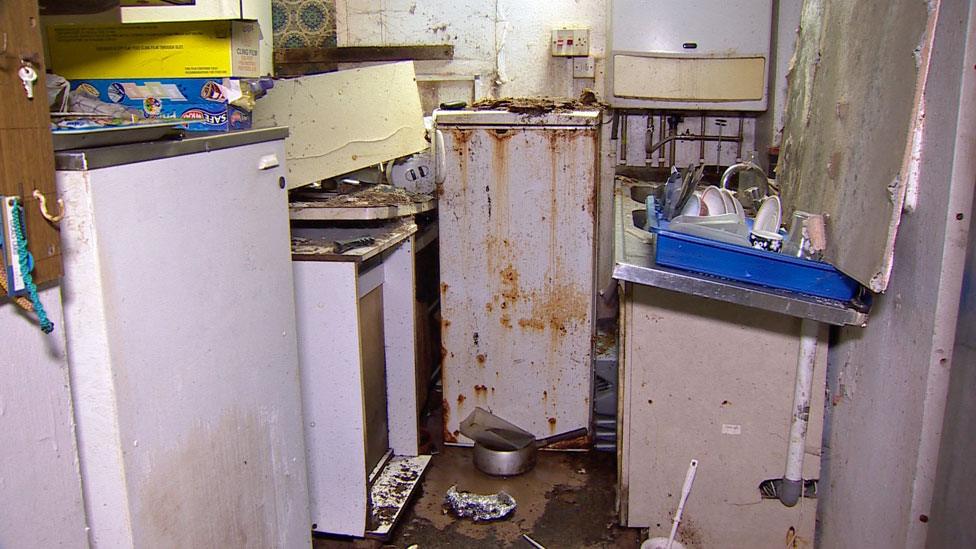
A filthy kitchen in an HMO
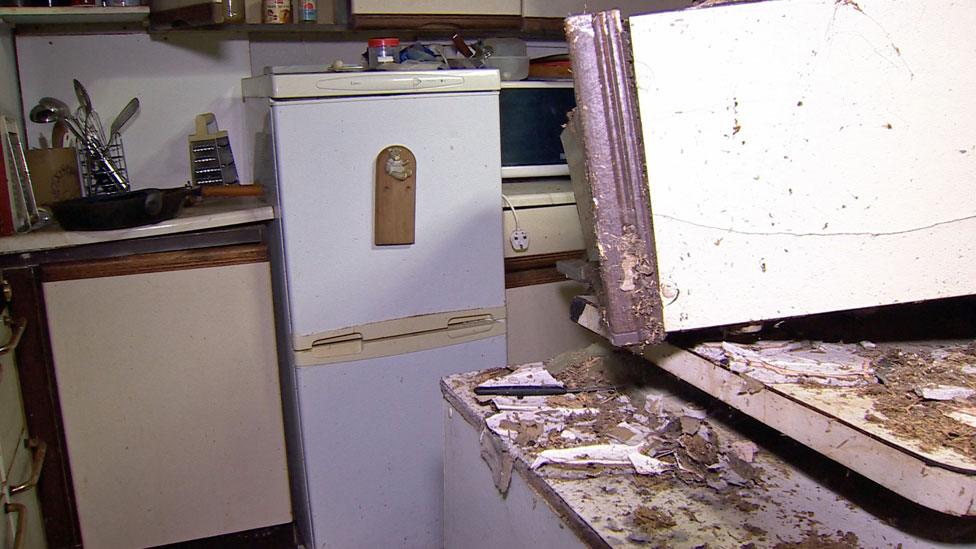
A kitchen where a cupboard seems to have fallen off the wall.
Finding accurate information about the number of HMOs across the UK is not straightforward. Each local authority keeps figures, but these are only estimates as not all HMOs have to be licensed - only larger properties over three storeys high with five or more unrelated tenants and shared facilities.
The National HMO Network, made up of local authorities, environmental health officers and landlords, says there were 543,000 HMOs in England in 2013-14. The number is rising and more and more people are living in them.
Badly run HMOs are a problem across the UK, but in Blackpool they have become one of the town's most urgent priorities.
With the decline of its tourism industry, many former guesthouses have been turned into HMOs without needing any change in planning permission.
A 10-bed property in Blackpool can cost as little as £60,000 to £70,000. Landlords can collect £85 per week for each room, often from housing benefit. This lucrative trade is attracting landlords from all over the UK and overseas.
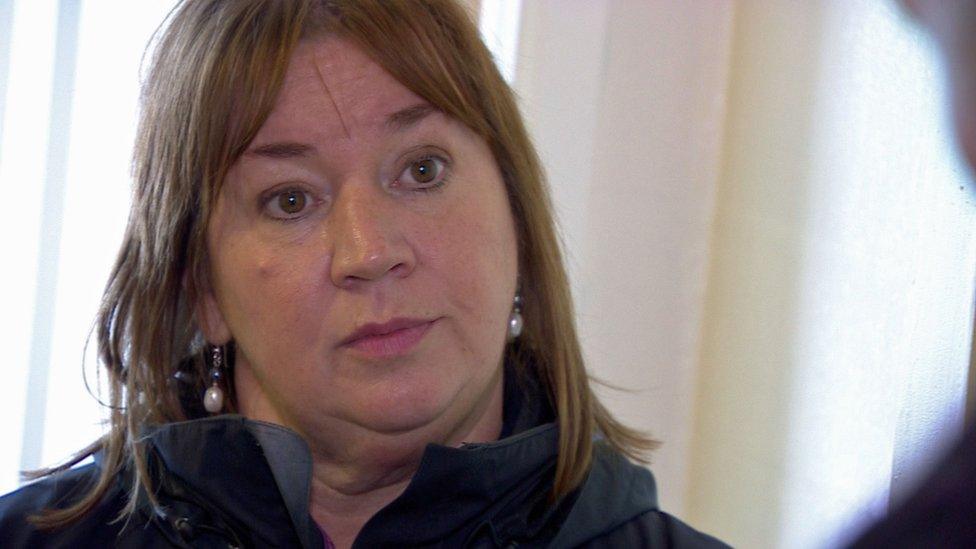
Alex Bracken - always prepared with a can of flea spray
Next on their round of inspections, housing officers visit a property in a road of red-brick terraces. In the front garden the rubbish bins are overflowing. A tattered mattress lies across a bed of weeds.
In the downstairs flat, lives Michael Buckley, with his partner Shauny Goodman and their two small children. He has two other children who stay at weekends.
Housing officers are here to inspect the property because he has complained about damp. Buckley shows them dark musty patches on the walls.
"It's horrible living here. It's damp," he says. "I've got kids who are in it every day. My little girl is even saying: 'It smells in your room, Dad.'
"So we have to constantly wash our clothes. The washing machine is blasting all the time. My clothes are fresh, but when I put them in the room there's a musty smell."
Housing officers find several problems with the property. Bracken tells him she will send a schedule of works to the landlord. He has 28 days to respond.
Last year her team made 4,000 inspections like this in Blackpool. Half the properties were found to be below standard and her team ordered landlords to make improvements.
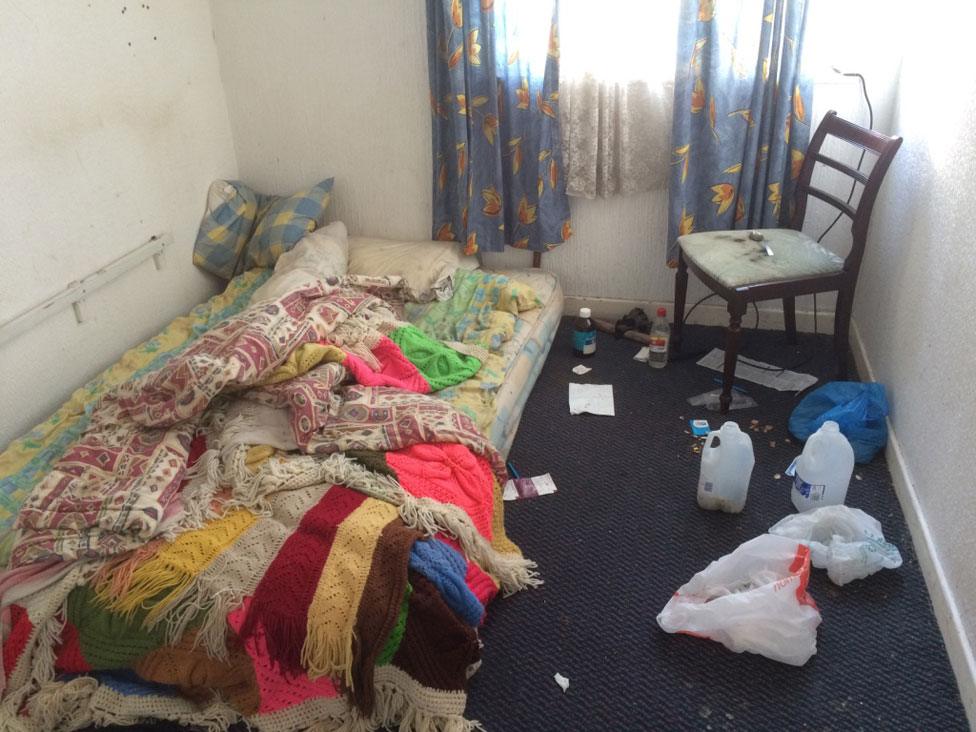
A dirty bedroom
"Blackpool has a major problem with HMOs," says Tim Coglan, Blackpool Council's head of public protection. "You have some badly run properties that are rundown, dangerous and the focus of anti-social behaviour and crime.
"The vast majority are run on the basis of spending the minimum on upkeep, cutting corners as far as possible."
Blackpool Council says it has prosecuted more landlords than any other unitary authority in the UK. It also runs a selective licensing system in some areas, requiring landlords to register properties.
Blackpool is the seventh most deprived area in England, according to statistics published last month by the Department for Communities, based on employment, housing, health, crime and income levels.
Coglan says many unemployed people from all over the North West move to Blackpool. "'Transients' are a problem in Blackpool. A lot of people with no connections to the town and a high level of social need come here," he says.
"There are poor people some who have no connection to Blackpool housed in substandard accommodation whose needs are not being met - they may have issues with drugs and alcohol. So it is not just enforcing against bad landlords it's about making sure tenants get the help they need."
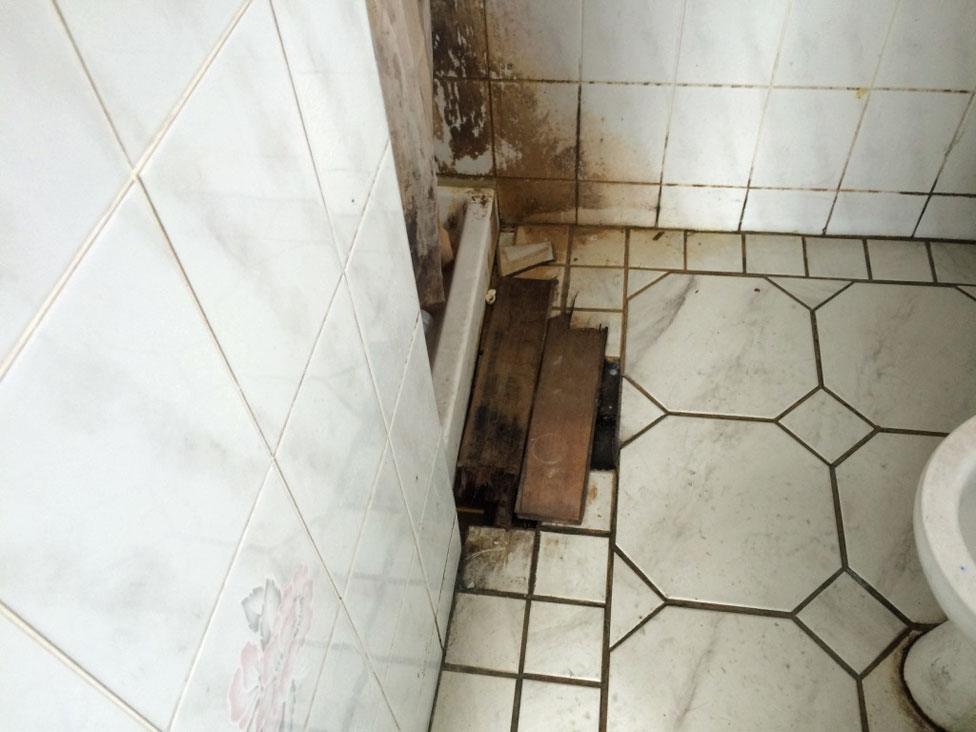
A bathroom, dirty and patched up with broken wooden boards
However, there are some who think not enough is being done to stop the growing number of HMOs. Charlie Docherty runs the Astoria Hotel in Hull Road, a guesthouse near the seafront.
"It used to be great living here but it's not any more," he says. "All we talk about is the same issue - HMOs. We hear ambulances going by, sirens going past… people lying in the street off their faces."
"The council's mantra is 'we want families back'. Families won't come back when they are approached by aggressive begging, drug dealing, prostitution, anti-social behaviour."
Docherty, a Glaswegian who worked offshore before buying his hotel, points out a four-storey former guesthouse, now an HMO which he says has been a focus of anti-social behaviour.
"It's the worst house on the street. The police are constantly round here," he says.
At that moment a car pulls up and out steps a suited man with a large chain of keys around his neck and a yellow torch in one hand. John Bartram, owner of JJ Property Services, manages 400 HMOs in Blackpool.
He has come to inspect the property, but Docherty challenges him. "Properties like yours are the reason people are not coming back to Blackpool."
Bartram stands his ground. "If properties are run properly, which I do my utmost to ensure, I can't see anything wrong with these places."
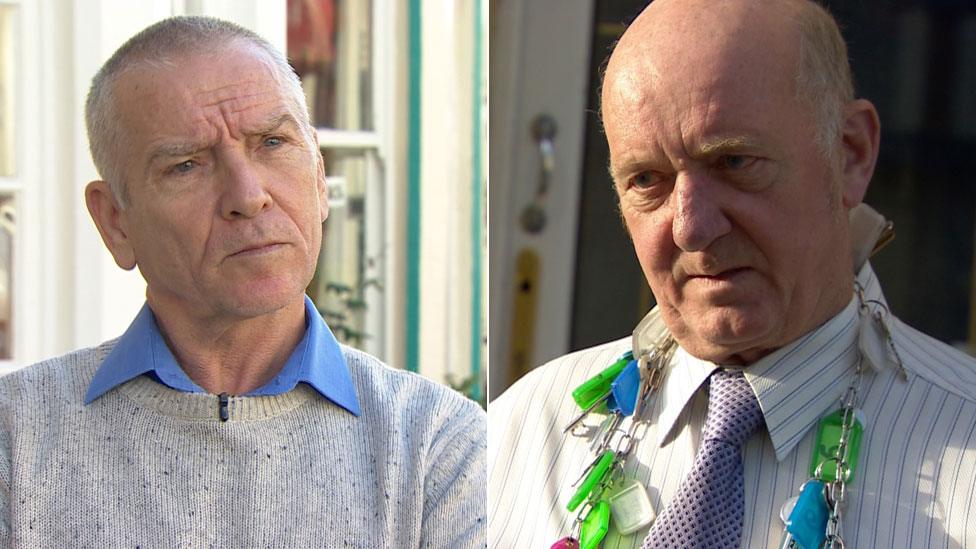
Agreeing to differ - Charlie Docherty and John Bartram
Bartram says he has evicted problem tenants from this building and works hard to resolve any problems. But Docherty continues his complaint, pointing at the exterior of the property.
"Look at the railings. The bells. This is one of the best streets in Blackpool. Clean it up. A lick of paint. If you want decent tenants you need a decent property."
"On behalf of my landlords, they are on budgets, they have big mortgages," Bartram argues. "As long as the inside complies with what is acceptable to the local authority."
Bartram worked as a coal miner until 1993 when he used his redundancy money to buy a Blackpool hotel. Nine years later he sold it and began his lettings business. He has landlords from across the UK and some from overseas.
John Bartram and Charlie Docherty part with a handshake, agreeing to differ.
However, while much of the UK is suffering from a shortage of homes, some think Blackpool's problem is that it has too many.
Like many councils, Blackpool's is also facing steep budget cuts. The workload of its housing enforcement team is unlikely to slacken off any time soon.

Housing Britain

Interactive: Where can I afford to live?
In video: What the average price will buy you
Q&A: Why are starter homes controversial?
Mark Easton: The political power of bricks and mortar

A selection of your comments:
The main problem with the rooms shown appears to be dirt and neglect. A luxury mansion flat in Belgravia would look pretty grim if filth and grease accumulated all around the kitchen and mould was allowed to grow on the shower. Do people not clean anything in these houses? As there were no other views of the property to give any idea of the structural condition, I can only say from what is shown that some hot water, soap, disinfectant and a scrubbing brush might well work wonders and improve life all round for the tenants. Make a rota!
Rosina Clark, Colchester, UK
I have lived in a HMO for just under two years now. As much as it is not ideal, it's cheap and all that I can afford as a single person, even though I work full time. I find that problem tenants are dealt with very quickly, in the hope of gaining some stable tenants. However, as this article points out, repairs and maintenance from landlords is hard to get. The house I am in does have damp, and this and it's cause have been pointed out, but little has been done. The boiler doesn't hold its pressure, there are many drafts and the house doesn't have insulation, so it becomes very cold in the winter. I wouldn't recommend this to anyone that has the money to live in a small flat or house, but for me that just isn't an option right now.
Stephanie Owens, Gillingham, UK
I've lived in shared properties but I didn't treat them like the interior cleanliness was my landlord's responsibility. These people are paying for a room in a house, not a maid, so surely the general cleaning is their responsibility. The landlord does of course have their role to play but why should that extend to doing the tenants' washing up, vacuuming and taking their bins out on bin day? The houses in this article are disgraceful and the tenants should be evicted if they cannot keep them clean enough for habitation and behave like decent members of society.
Tessa, Basingstoke, UK
Very very disturbing, especially at the time when HMO industry gets all nuts and bolts tighten up to all possible and impossible limits. As we can see here - this excessive regulations clearly don't add any more value. Those who allow this kind of disgrace will never even consider them. Those who do however, suffer the most, as there is clearly over-complicated regulations exist in this industry and they (agents and landlords) are barely able to catch up with all those little nuances. Stop the madness - do the basics! On the other hand, just by looking at the pictures above, there is so much more Tenants themselves can do to keep it in a much better shape. Let's not blame just agents here. Dump - yes, up to agents to sort out, but all that rubbish on the bad, carpet and all over the place - I am sorry, what kind of people live there? You don't need millions to keep all this stuff nicely where it belongs and look after your bad and carpet properly. They just don't care about themselves - why would they expect someone else to take care about them?
Alex Soul, London, UK
Subscribe to the BBC News Magazine's email newsletter, external to get articles sent to your inbox.